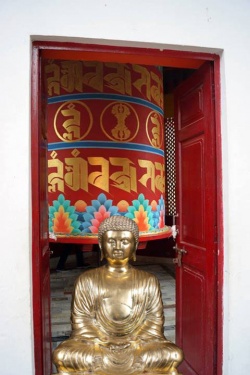Difference between revisions of "Dukha"
Jump to navigation
Jump to search
| Line 1: | Line 1: | ||
[[File:1017gf9 n.jpg|thumb|250px|]] | [[File:1017gf9 n.jpg|thumb|250px|]] | ||
<poem> | <poem> | ||
| − | [[dukha]] ([[dukka]] or [[tong-ka]]) is usually translated as [[suffering]] or stressful, but is meant to represent the unsatisfactoriness of [[life]] in [[samsara]]. The first of the [[Four Noble Truths]] taught by the [[Buddha]]. | + | [[dukha]] ([[dukka]] or [[tong-ka]]) is usually translated as [[suffering]] or stressful, but is meant to represent the {{Wiki|unsatisfactoriness}} of [[life]] in [[samsara]]. The first of the [[Four Noble Truths]] [[taught]] by the [[Buddha]]. |
The eight types of [[dukha]] are: | The eight types of [[dukha]] are: | ||
Latest revision as of 03:13, 10 October 2014
dukha (dukka or tong-ka) is usually translated as suffering or stressful, but is meant to represent the unsatisfactoriness of life in samsara. The first of the Four Noble Truths taught by the Buddha.
The eight types of dukha are:
1) birth;
2) aging;
3) death;
4) sorrow, lamentation, pain, distress, & despair;
5) association with what one does not want;
6) separation from what one loves;
7) not getting what one wants; and
8) intrinsic to existence (the five skandhas or aggregates).
One of the “eight winds.”
See also; Maha-satipatthana Sutta.
See also; Dukkha
